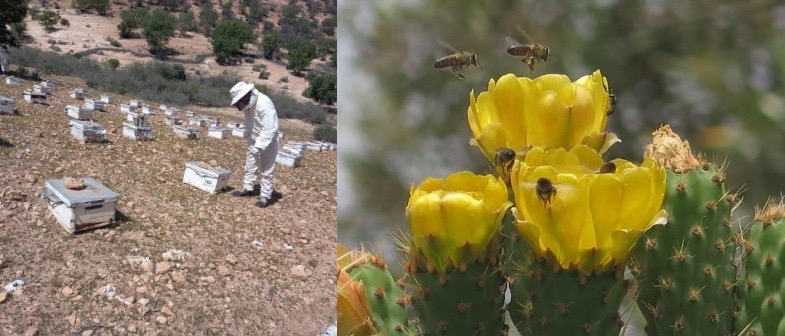The GoodPlanet Foundation and the ENGIE Foundation are acting for biodiversity in Morocco with the development of 10 beekeeping cooperatives in the Mesguina forest to enable producers to develop their beekeeping business profitably and sustainably, as part of its commitment to biodiversity and the climate.
The Mesguina forest (near Agadir) is in the Arganeraie biosphere zone, a UNESCO World Heritage site. Its rich biodiversity offers strong beekeeping potential, thanks to high altitude forests rich in thyme and seaside areas populated by euphorbia. Beekeeping is a significant resource (up to 40% of income) for the inhabitants of this area, hard hit by the rural exodus.

© GoodPlanet
Project objective: to promote and develop a sustainable beekeeping industry and raise public awareness of the issues involved in preserving bees
Bees are essential for pollinating flowers, helping to maintain biodiversity and the ecological balance of ecosystems. They also play a vital role in the various life phases of many plant species, both wild and cultivated (impact on the many citrus and vegetable crops in the nearby Souss plain).
This project will provide support for beekeepers whose swarms have been severely affected by the impacts of climate change, including several years of persistent drought. It also aims to provide support through capacity-building, particularly in terms of strategy, finance and product development.
EXPECTED RESULTS :
- 95 beekeepers from 10 supported cooperatives
- 4 cooperative honey houses equipped with collective equipment (for extracting, ripening and potting honey)
- 4 cooperative premises upgraded to Moroccan sanitary standards
- 40 beekeepers trained in beekeeping techniques, conservation of bee breeds, health standards, quality control, etc.
- 1 feasibility study for a “Mesguina forest honey” label
- Visit to a honey house and exchanges of experience between beekeepers
- 100 students from 9 rural schools learn about bee conservation
- 30 farmers and beekeepers work together to prevent pesticide-related bee mortality.

UCTM stand - Meknes Agricultural Fair © GoodPlanet
Workshops to raise awareness of bee conservation
The region’s beekeepers and farmers were made aware of the importance of using organic and environmentally friendly products to ensure the safety of bees. Apart from drought, bee swarm mortality in the Souss Massa area is due to intoxication by phytosanitary treatments of crops, especially citrus fruits.
This year, schoolchildren in the villages of the cooperatives concerned will be made aware of the role of bees in biodiversity and human nutrition. 8 teaching aids have been created to accompany the workshops in the classrooms.

